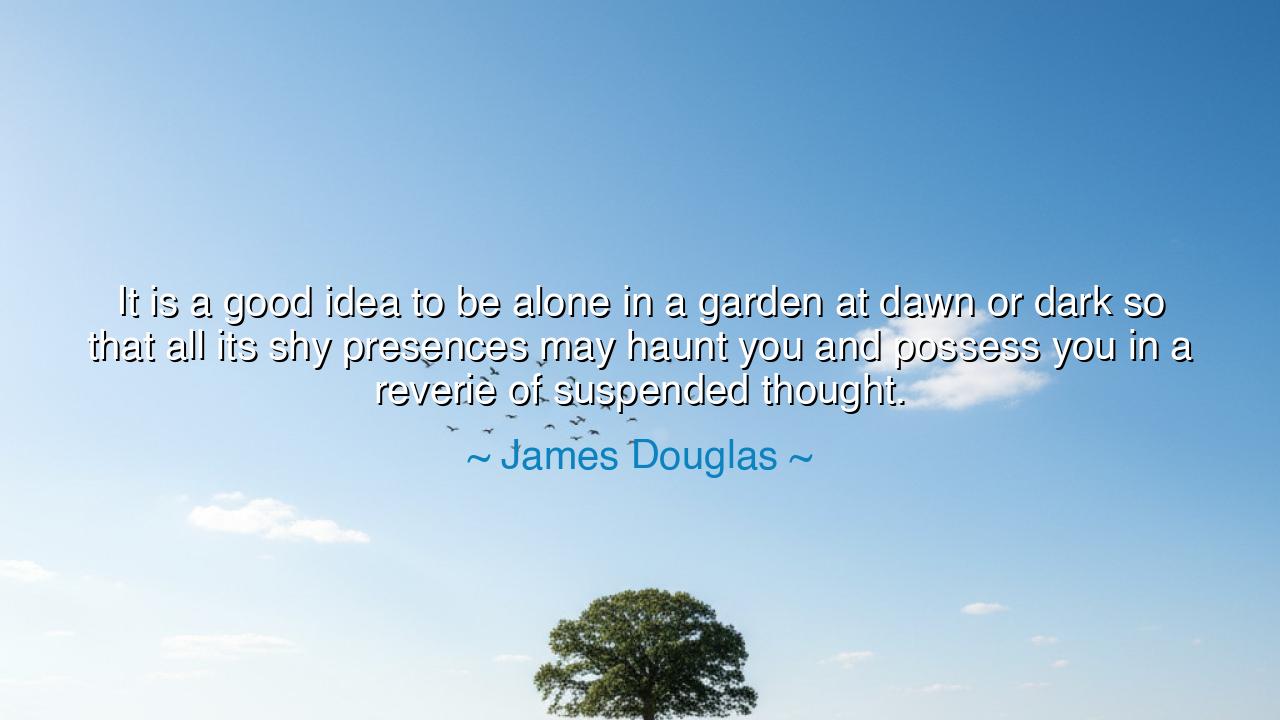
It is a good idea to be alone in a garden at dawn or dark so that
It is a good idea to be alone in a garden at dawn or dark so that all its shy presences may haunt you and possess you in a reverie of suspended thought.






"It is a good idea to be alone in a garden at dawn or dark so that all its shy presences may haunt you and possess you in a reverie of suspended thought." These evocative words by James Douglas invite us into the intimate, sacred space of nature, urging us to experience the world with stillness and presence. There is something deeply powerful in the idea of solitude, particularly when one is immersed in the quiet beauty of a garden—a place where life grows in delicate harmony. By being alone in this environment, we open ourselves to the subtle energies that flow through the plants, the earth, and the air. In the early hours of dawn or the deep quiet of night, the garden becomes a sanctuary where the restless mind can become still, and the shy presences of nature, those often unnoticed details of life, can gently reveal themselves.
In the ancient world, the concept of solitude in nature was revered by many, especially among the philosophers and spiritual seekers. Aristotle, for instance, believed that true wisdom and understanding could be found not just in conversation and intellectual pursuits, but in the moments of quiet contemplation in nature. He recognized that the natural world was a reflection of universal truths, and that moments of solitude within nature allowed the soul to align with those truths. The stillness of a garden, for Aristotle, was a perfect setting for the soul to connect with the divine order of the universe. Douglas’ words echo this ancient wisdom, suggesting that by being alone with nature in its purest form, we become receptive to its deeper, more subtle forces—forces that can guide us toward a higher understanding of ourselves and the world around us.
The ancient Stoics also recognized the importance of nature as a space for self-reflection and spiritual growth. Epictetus, in his teachings, emphasized the idea that to truly understand our place in the world, we must learn to embrace moments of stillness and reflect upon our connection to the natural world. Marcus Aurelius, too, found solace in nature, often turning to the tranquility of the natural world to find clarity in his thoughts. His meditations speak of the importance of disconnecting from the noise of society in order to attune the mind to the greater truths of existence. Douglas' call to embrace the solitude of a garden at dawn or dusk is, in this sense, an invitation to engage in that same quiet reflection that the Stoics valued so highly, where the mind and spirit could merge with the quiet wisdom of nature.
In the more recent example of Henry David Thoreau, we find a similar celebration of solitude in nature. Thoreau’s famous work, Walden, is a testament to the power of solitude, simplicity, and immersion in the natural world. In the stillness of his cabin by the pond, Thoreau sought to free himself from the distractions of society in order to experience life as it truly was—unfiltered and raw. The act of being alone in nature, for Thoreau, was a means to reach a deeper understanding of the self and of the world. Similarly, Douglas’ words about being alone in the garden reflect this idea that, in the absence of distractions, we can be haunted by the deeper presences of the natural world—those subtle energies that remind us of the mysteries of life.
The lesson in Douglas’ words is clear: there is great value in solitude, especially when immersed in the natural world. In the quiet spaces of a garden, we are invited to suspend our usual thoughts and to open ourselves to the subtle, shy presences that we might normally overlook—the rustling of leaves, the fragrance of flowers, the soft hum of the earth. These are not merely mundane details but whispers from the universe, offering us the opportunity to reconnect with the sacredness of life. By embracing solitude in nature, we allow ourselves to be possessed by the beauty and wisdom that surround us, filling our hearts and minds with a deeper sense of peace and clarity.
In our own lives, we can cultivate this practice of solitude and contemplation in nature. Whether through quiet moments in a garden, a park, or simply a walk in the woods, we should take time to disconnect from the distractions of modern life and reconnect with the natural world. This is not just a form of relaxation, but a powerful way to reflect, recharge, and rejuvenate our spirits. Just as Douglas suggests, let us allow the shy presences of nature to haunt us, to stir within us a deeper sense of connection and understanding. In these moments of quiet solitude, we can find the space to listen to our hearts, to reconnect with our inner wisdom, and to come away from the experience with a renewed sense of purpose and insight.
In doing so, we find that the garden—whether literal or metaphorical—is not just a place of beauty, but a sacred space where the mind can be still, the soul can be nourished, and the deepest parts of us can awaken. By embracing this kind of solitude, we honor both the quietness of nature and the richness of our own inner landscapes, allowing us to live with greater awareness, purpose, and peace. Let us, like the ancient philosophers and spiritual seekers before us, find strength and wisdom in the silence of the world around us.






AAdministratorAdministrator
Welcome, honored guests. Please leave a comment, we will respond soon